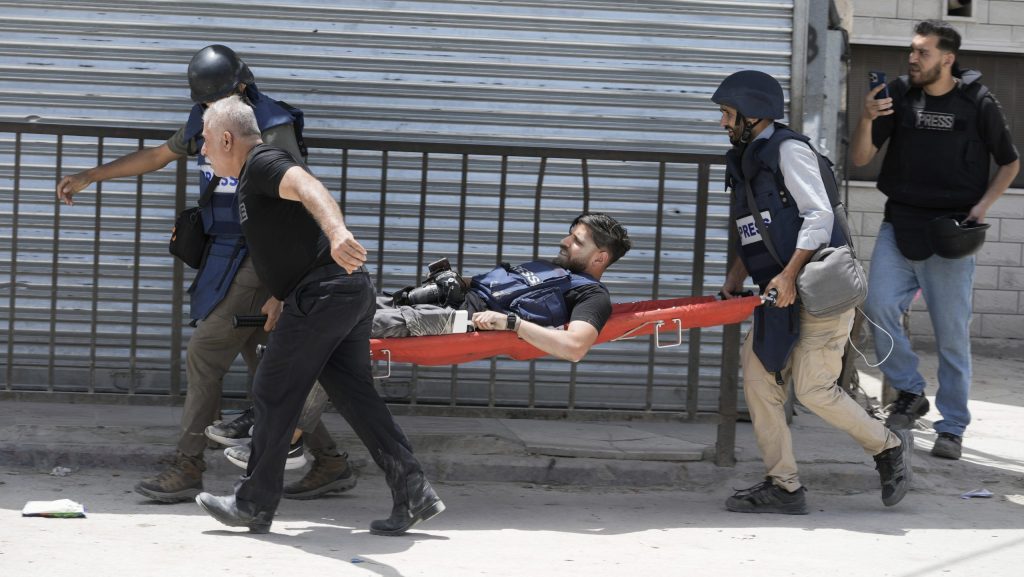The Israel-Hamas war is taking a deadly toll on journalists
Russ McNamara May 21, 2024The nonprofit Committee to Protect Journalists says at least 105 reporters have been killed since the Oct. 7 Hamas terror attacks in Israel.

Journalists carry their colleague after he was shot in his leg during an Israeli military raid in the West Bank Jenin refugee camp, Tuesday, May 21, 2024. Israeli forces raided a militant stronghold Tuesday in the occupied West Bank, killing at least seven and wounding several, according to the Palestinian Health Ministry. The raid into the Jenin refugee camp is part of months of surging violence in the Palestinian territory. (AP Photo/Majdi Mohammed)
It’s been two years since Palestinian-American journalist Shireen Abu Akleh was killed by an Israeli sniper.
She was on the job for Al Jazeera in 2022 covering an Israeli Defense Force raid on the Jenin refugee camp in the West Bank.
Abu Akleh was not the first journalist to die covering conflict in Israel, but her death was seemingly prophetic.
The Committee to Protect Journalists says at least 105 reporters have been killed since the Oct. 7 Hamas terror attacks in Israel. The independent nonprofit reports that of the 105 journalists and media workers killed, 100 were Palestinian, two were Israeli and three were Lebanese. The CPJ says that additionally, 16 journalists were reported injured, four reported missing and 38 have been arrested, as well as reports of numerous assaults, threats and attempts to censor — making the conflict extremely difficult to cover.
Listen: The Israel-Hamas war is taking a deadly toll on journalists
Recently, there was a memorial symposium at Arab Center Washington D.C. looking back at Abu Akleh’s legacy and the challenges that remain in covering conflict in the region.
Akbar Shahid Ahmed, the senior diplomatic correspondent for HuffPost, participated in the symposium.
Largely, western media outlets have not been given access to Gaza by Israel. And there has not been a push to put reporters on the ground by western outlets because of the considerably safety risk.
For the Arab and Palestinian reporters for outlets like Al Quds and Al Jazeera that are reporting from the inside, they are often dismissed as propagandists, he says.
“You’ve seen efforts by to some extent, the Israeli government, by pro-Israel voices saying ‘well aren’t these people may be connected to Hamas, these people may be suspects in some way,'” Ahmed said.
Sometimes that mistrust comes from outlets who do manage to talk with Palestinians and get their experiences.
“Often editors may have doubts about the accuracy of the story,” he said. “There may be pressures to present things a certain way and say, ‘but is it as bad as as the Palestinians are seeing?'”
Despite the issues traditional news media are having in covering the war in Gaza, there are many within the U.S. State Department that know exactly what is going on. A recent report showed that some of the Israeli Defense Force’s actions in Gaza have bordered on war crimes, but did not expressly state it. U.S. law states that America cannot contribute to a conflict if there is evidence of war crimes.
“If Israel decides to go ahead with the ground invasion [in Rafah], then I think you would see, potentially scores of people quit the [U.S. State] department.”
– Akbar Shahid Ahmed, senior diplomatic correspondent for HuffPost
Last week, the Biden Administration announced it was still seeking an additional $1 billion in bombs and ammunition for Israel. That support has upset many within the U.S. Government and those supporting a ceasefire — especially as Israel ramps up its military ground invasion in Rafah, a southern border city in Gaza filled with hundreds of thousands of refugees.
“If Israel decides to go ahead with the ground invasion, then I think you would see, potentially scores of people quit the [U.S. State] department,” Ahmed said.
This week, a Biden-appointed staffer within the Dept. of Interior resigned, calling U.S. support for the war in Gaza “deeply wrong.”
“Some of the previous dissent has been from the U.S. Agency for International Development (USAID), from the people who are working on international law and human rights at the State Department,” Ahmed said. “This is their expertise, right? They were trained to not let these things happen. How can they be in an office pushing the paperwork that either overlooks this or actually enables that?”
Read more:
- Long history between Israelis and Palestinians fueling a war without end, WSU professor says
- Michigan research institute examines impact of war in Gaza on religious minorities
- The war in Gaza’s impact on the American Jewish community
Trusted, accurate, up-to-date.
WDET strives to make our journalism accessible to everyone. As a public media institution, we maintain our journalistic integrity through independent support from readers like you. If you value WDET as your source of news, music and conversation, please make a gift today.
